Anyone dealing in Bitcoin needs a good blockchain explorer. Using Bitcoin without a good blockchain explorer is like using the internet without a good search engine. Sure it’s possible, but you miss out on so much great information.
Blockchains are basically huge public databases, and as such are designed for ease of exploration of the data contained within them. And while we have a wide choice of blockchain explorers now, that wasn’t always the case. It’s taken some time for blockchain explorers to evolve to the level they’ve reached in 2019.
In this post, I will give you an overview of some of the best Bitcoin block explorers currently on the market. I will also give you some hints and tips so that you could make the most of these nifty tools.
Need for a Bitcoin Block Explorer
Traditionally Bitcoin holders have used blockchain explorers primarily to keep an eye on the progress of transactions, to see how long until a send or receive transaction would take to be verified. Today’s blockchain explorer has so many other features, allowing users to uncover data that would have been extremely difficult to locate in the past, if not impossible.
Here are some of the things you can accomplish with a good blockchain explorer:
- List out recent blocks;
- Search for specific transactions;
- Get links to previous and next transactions, including each input and output;
- Generate a list of all transactions for any address;
- Look up current address balances, or historic address balances;
- Search for specific addresses, transactions, or blocks.
Top 10 Bitcoin Blockchain Explorers
While there is no hard-and-fast rule that one can use to determine the "best" block explorers, there are a number of them that have stood the test of time and are well supported by the community. Some of these even have support for blockchains other than Bitcoin's.
With that being said, let's jump right into the list of the best block explorers (in order of preference) ?
1. Blockchain.com
Until recently this best-known Bitcoin blockchain explorer was located at Blockchain.info. It remains the most popular Bitcoin blockchain explorer and is also a very solid blockchain explorer, although its features remain pretty basic by today’s standards.
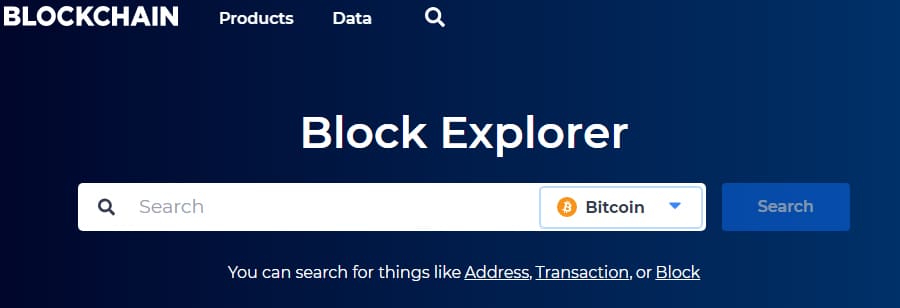 Search by address, tx ID or block for BTC, BCH and ETH
Search by address, tx ID or block for BTC, BCH and ETHStill, it gives you the ability to do basic searches of addresses, transactions and blocks, and the user interface is solid. It’s also a reliable and trusted service. One of the best features at Blockchain.com is the mountain of stats available for the Bitcoin activity in the past 24 hours. This includes info on the price, hashrate, difficulty, TXs per day, average fee, uncomfirmed transactions and Mempool size.
You can also head on over to their charts section where you can gather much more extensive data. This includes statistics on wallet activity, network activity and more mining details. The charts can be extended out to the beginning of the Bitcoin blockchain.
Need more?
There are also Ethereum and Bitcoin Cash explorers available as well as an extensive API for the budding developer in you. This will allow you to pull the blockchain.com's data and use them in your own applications and websites.
2. Blockchair
Need to find something on the Bitcoin blockchain? Look no further than Blockchair, which has as its tagline; “Search the blockchain world for anything.” There’s a wealth of information here about the Bitcoin blockchain, including the current difficulty, number of nodes, transaction fees, mempool size, and more. Blockchair is one blockchain explorer that doesn’t rest on its laurels but continues making improvements.
 Ability to search numerous Coins
Ability to search numerous CoinsYou could get overwhelmed here by the number of variables you can search. You are even able to search for phrases or individual words that have been encoded into blocks. This lets the curious find out if their favorite team or university has been permanently added to the blockchain. Blockchair also has blockchain explorers for Ethereum, Litecoin, Dash, Dogecoin, Bitcoin Cash and Bitcoin SV.
For the Night Owls ?: You can switch the User Interface to to their "dark mode"
Something that I really found quite useful was their "compare" tool. This allows you to compare the blockchain, mining and network statistics for all of the coins that they keep data for. This is presented side by side for an easy comparison.
3. Tokenview
Tokenview is one of the more recent Bitcoin blockchain explorers to hit the market. It was developed by a Chinese team primarily for the Chinese markets, and you’ll find the occasional translation issues if you’re accessing the site in English. It makes up for its shortcomings by being one of the broadest multi-chain explorers available.
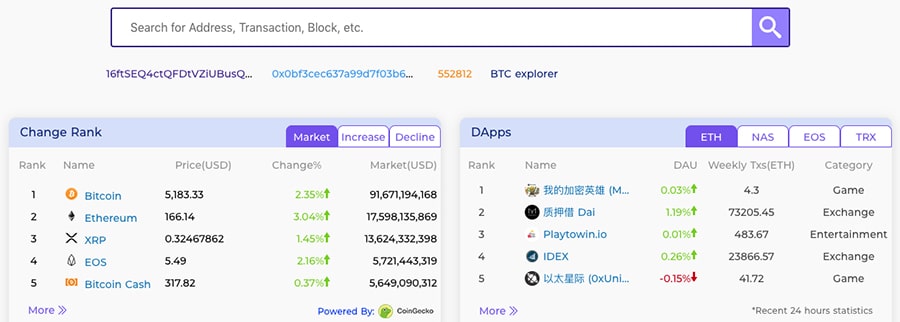 Block Explorer and Crypto / Dapp Market overview
Block Explorer and Crypto / Dapp Market overviewIn addition to a blockchain explorer for Bitcoin, you’ll find blockchain explorers for 70 additional altcoins, with new coins added all the time. There’s also a powerful dApp explorer. Tokenview truly is one of the most powerful and feature-rich blockchain explorers available.
For the Miners ⛏️: There is a mining section that goes through top minable coins and includes a handy mining return calculator
4. Bitcoin.com
The blockchain explorer at Bitcoin.com is a clean and minimal design that makes it easy to use. Both Bitcoin and Bitcoin Cash are featured and the blockchain explorer is just a small part of the toolset and information you’ll be able to access at this handy site. Give it a look and you may find yourself exploring for several hours.
5. Block Explorer
The open source project at Block Explorer makes it easy to explore transactions, blocks, and addresses with their free Bitcoin blockchain explorer. You can also see any fees for transactions, their inputs and outputs, and the number of confirmations.
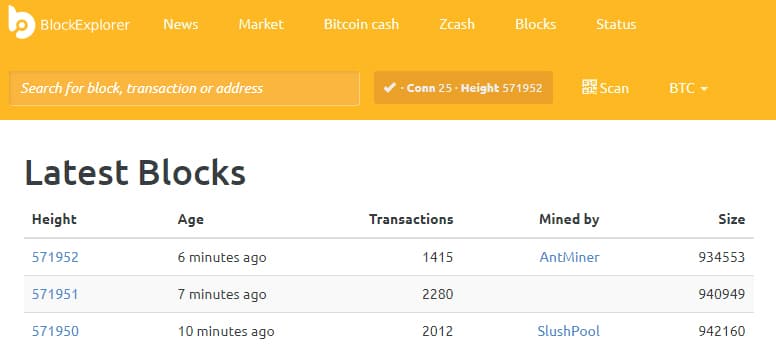 The main user interface of Block Explorer
The main user interface of Block ExplorerIn addition to the Bitcoin blockchain explorer, you can also find a Bitcoin Cash and ZCash blockchain explorer here. Plus they also support German, Spanish and Japanese in addition to English, and you can view four different currency units (BTC, USD, mBTC and Bits).
Pro Tip ✔️: If you are using your phone then you can use their QR code scanner to quickly load the address in question
6. BlockCypher
The project at BlockCypher is another free open-source project for exploring the transactions, blocks, and addresses on the Bitcoin blockchain. It has one of the cleanest user interfaces, and there’s little doubt for users on how to use the blockexplorer and how to navigate the site. It has a real-time feed, which is cool, but it also has some unique features that are equally cool.
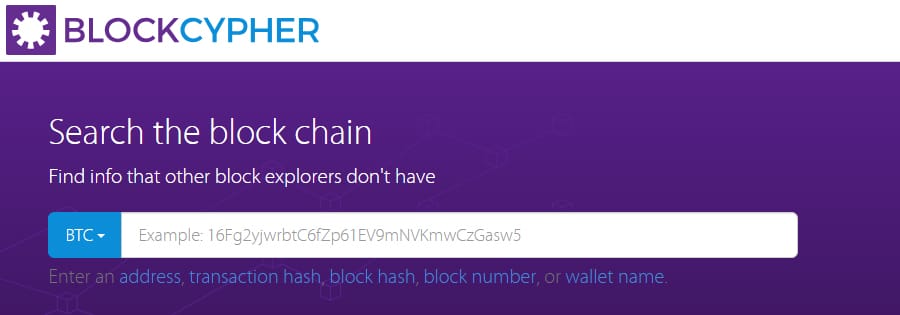 BlockCypher Blockchain Scanner
BlockCypher Blockchain ScannerThese include confirmation predictions, suggestions for transaction fees, and a public address notification for Bitcoin cold wallets. In addition to supporting Bitcoin it also has support for Litecoin, Dash and DogeCoin, although it doesn’t support Bitcoin Cash.
Like the blockchain.com explorer, BlockCypher has a pretty robust API which means that you can develop applications off of their platform. There is also extensive documentation on using this API.
7. BTC.com
BTC.com is another of the older blockchain explorers and many users prefer it for the real-time block feed shown as soon as you arrive on the homepage and for its easy to navigate user interface. It also has a handy calendar built-in that can be used to locate blocks and transactions.
It’s an information-rich site, and besides the basic searches, you can also see things like the best current transaction fees, a historical fee trend, a list of unconfirmed transactions and interesting rich lists. Moreover, you can view historical wallet transactions and balances in user friendly charts.
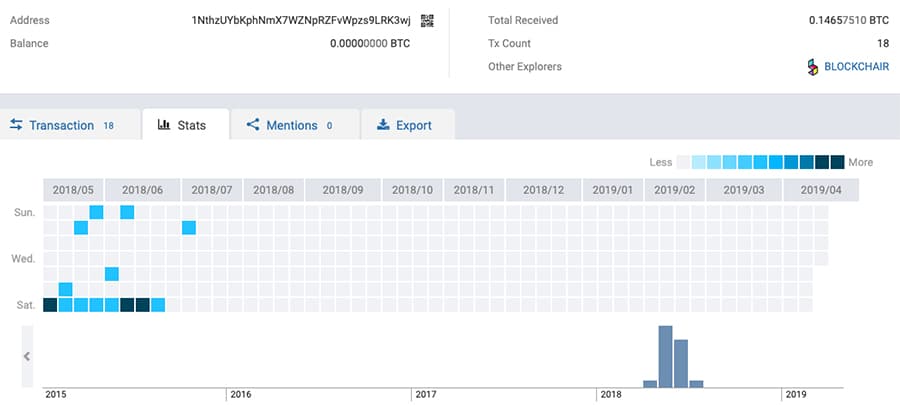 Historical wallet statistics in chart form on BTC.com
Historical wallet statistics in chart form on BTC.comOne unique data set on BTC.com is how many times a public Bitcoin address is mentioned on the internet. In addition to Bitcoin data, you can also explore Ethereum and Bitcoin Cash at BTC.com.
Finally, for the miners out there, BTC.com could probably double up as your go-to resource for all things mining related. They have all the statistics when it comes to pool distribution, network hashrates, difficulty etc. Indeed, BTC.com is itself a massive mining pool so this makes sense.
8. BitcoinChain
BitcoinChain is another great blockchain explorer that gives a real-time view of the blockchain right on the homepage. You’ll find loads of other information here as well.
Perhaps best of all is that everything on the site is well organized and easy to locate. I like the focus on mining pools at the site, which will even tell you which blocks were mined by individual mining pools. The site also tracks the Bitcoin market and network nodes and has its own free wallet service.
Lightning Users ⚡: You can enter your node URI in their Lightning tracker to open your network channel
9. TradeBlock
The TradeBlock blockchain explorer is well known among cryptocurrency enthusiasts. It is both loved and hated for its sparse, black background and unique presentation. That’s not to say it isn’t a complete blockchain explorer. It gives you all the basic information, and data is nicely formatted, including links to individual transaction hashes.
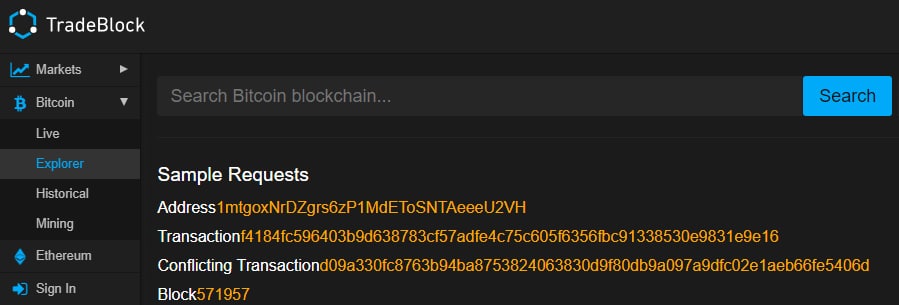 The Sparse UI of the TradeBlock explorer
The Sparse UI of the TradeBlock explorerIt keeps track of the number of confirmations for each transaction, and will even differentiate between the number of inputs and outputs. Data geeks love TradeBlock and if you love raw data you will too.
For the traders ?: They have a neat markets section that gives you the latest trading stats, prices, order books and market depth charts.
Finally, like most other explorers on this list, TradeBlock can also be used to keep track of transactions on the Ethereum blockchain. However, there is way less functionality here than there is for the Bitcoin blockchain.
10. Insight.is
The Insight.is blockchain explorer is an open-source bitcoin blockchain API. The Insight REST API provides users with a convenient, powerful and simple way to read data from the bitcoin network and build services with it.
It provides an exhaustive array of data on the Bitcoin blockchain, including data about double-spend attempts, inputs/outputs, and advanced transaction details. It can also do currency conversions on the fly using Bitstamp rates.
Conclusion
There you have it, the top 10 best Bitcoin block explorers. Every Bitcoin user should become familiar with blockchain explorers because they are part of the reason that Bitcoin remains transparent and open.
Plus they can be fun to play with...
If you haven’t done it before try using a block explorer to look at the genesis block mined by Satoshi Nakamoto back in 2009. It’s a great history lesson and a good introduction to using one of the powerful features of the decentralized blockchain.
In the end, which Bitcoin block explorer you do decide to use comes down to your own personal preferences. If you are interested in studying other blockchains then you may be interested in the explorers with additional coin support. Alternatively, if you are a miner or trader, you may want to use one that has mining or market stats.
Of course, these blockchain explorers are completely free to use so there is nothing stopping you from selecting a couple of your favourites from the list above.



